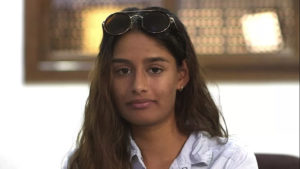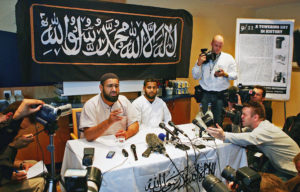I’ll never forget the moment I uncovered Umm Muthanna Al-Britannia’s real name. Back in early 2015, she was a brazen British propagandist and recruiter for the Islamic State. I’d been tracking her for months, almost marvelling at her shamelessness: she had posted pictures of herself brandishing an AK-47 on social media; she had justified the beheading of Western aid-workers; she had celebrated the 2015 Paris attacks; and she had scolded other Muslim women for not covering their faces (and eyes). She was terrifying, tormented and terrible. But who was she really?
Her name was Tooba Gondal, a then 21-year-old from East London. She was a savvy operator on social media and had revealed little about her personal life in her numerous pro-Isis Twitter accounts. But she couldn’t do anything about that tweet from an earlier account she had used before she became an Isis true believer. It was innocuous enough, but there it was: a casual reference to her father by his full name.
Last month, Benedetta Argentieri’s documentary The Matchmaker premiered at the Venice Film Festival. The film is about Gondal, who, in her incarnation as Umm Muthanna Al-Britannia, sought to enlist foreign women and girls to Isis, where they would become the wives of the male fighters. The film’s title self-consciously appropriates Gondal’s tabloid name (“the Isis matchmaker”), but there’s nothing remotely sensationalist or cheap about the film.
Argentieri first met Gondal in March 2019, where she was filming at the Ain Issa Camp, and where Gondal, now 28, had surfaced with her two young children shortly after Isis’s final territorial defeat at Baghuz. Never shy of media attention, Gondal was a willing participant in the documentary. The entire project is a riveting case study in the psychology of denial and dissimulation: Gondal portrays herself as a victim, flagrantly lies and contradicts herself. 1
“It’s a mystery why anybody talks to a reporter,” Lawrence Wright has observed. Why would you willingly expose yourself to a cold-hearted stranger with a story to tell? Of course, Wright knows all-too-well why people talk to reporters: because they want to be heard and understood, because they enjoy the attention and feel important, and because they want to shape or control the narrative about themselves.
Yet often they come to regret their credulity, realising that their journalist-interlocutor is not, in Janet Malcolm’s words, the “permissive, all-accepting, all-forgiving mother” they’d imagined, but “the strict, all-noticing, unforgiving father”. Even the most powerful and privileged people are susceptible to this delusion: earlier this year, when Mohammed bin Salman agreed to an interview with The Atlantic’s Graeme Wood, he must have thought that Wood would be a soft touch. (He wasn’t.)
Gondal, I suspect, will come to regret her involvement in Argentieri’s film. Perhaps she thought she could project an image of herself that would go some way towards reversing the negative press she’s received in the UK. Almost certainly, she would have enjoyed being at the centre of attention and welcomed the distraction it offered from the ball-breaking grind of life in the camp. No doubt she thought she was dexterous enough to walk the boards and avoid any trap doors that might lie in wait. On this last count, she failed.
Of all of Isis’s many war crimes, the genocide it perpetrated against the Yazidis is one of the gravest. It is by now well-documented that not only did the group brutally slaughter Yazidi men, but also subject thousands of Yazidi women and girls to sexual enslavement. It’s also well-documented that many Western men and women who joined Isis were active participants in this horrific genocide. Some of the most affecting scenes in The Matchmaker centre on two of its victims: 15-year-old Rawa and 22-year-old Salwa. Rawa was bought and sold 13 times. “The Isis women were really violent to us,” she says, adding: “My god, the women were worse than the men. They beat us up thousands of times, put us in obscene clothes, and sent us to the men.” Salwa concurs: “The women were the most guilty in the selling of our girls.”
Argentieri takes this up with Gondal, who denies knowing anything about the involvement of Isis women in such barbarity. Argentieri, who is a highly skilled interviewer, knows better than to express incredulity, much less outrage, at this response. She calmly follows up by asking Gondal if she’d ever met a Yazidi. Gondal bites: she says yes, but only once and at a dinner with other Western foreign Isis members. “She was maybe 13,” Gondal says of the Yazidi slave-girl. “She was very happy and in love with him,” she continues, referring to the girl’s Islamist slave-master. Having now fallen squarely into the hole, Gondal keeps on digging, caking herself in dirt and grime:
“He had spoiled her with everything that she wanted. She had her own phone, her own tablet, it was like very, very good treatment. I don’t know how much he bought her for, but she was crazy in love with him. I remember he wanted to eventually get rid of her, like he was just tired, she was just too clingy or I don’t know what the problem was. He wanted to sell her off to someone else and she was crying and she didn’t wanted to… I think one man from Saudi bought her.”
This is an astonishing piece of testimony, not simply because of the way in which Gondal inverts the victim-perpetrator relationship, but also due to the psychopathic insouciance with which she delivers it, and the utter contempt she shows towards a child victim of rape.
Another piece of striking testimony concerns Allison Fluke-Ekren (Umm Mohammed), who led the Khatiba Nusaybah, an all-female battalion based in Raqqa, and had plotted attacks on targets in America. In June, Fluke-Ekren, a 42-year-old former school teacher from Kansas, pleaded guilty to one count of providing material support to Isis and admitted to training over 100 women and girls for defensive combat.
Although Gondal doesn’t name her, she says she knew Fluke-Ekren “personally”, disclosing that “I saw her planning, I saw her training the women and everything… she was real, real American”. Gondal is adamant that she was not part of the Khatiba Nusaybah, yet she confides that she saw one of the Khatiba’s “training sites”, which she describes as a “very dark, underground basement”. Their aim, she says, “was to target every woman”. Despite clearly knowing a great deal about the Khatiba Nusaybah and its leader, Gondal claims that she didn’t even know how to use a gun.
Her tweets, however, tell a different story. On 1 March, 2016, she told her followers: “Muhajirat muaskar [an all-female training camp] is the best thing so far for me  loving it! Alhamdullilah [“Praise to God”]… firearm training is wajib [duty] in the land of Jihad.” In another tweet, using a different account, she declared that she was about to buy a Makarov [a Soviet semi-automatic pistol] and a suicide belt.
loving it! Alhamdullilah [“Praise to God”]… firearm training is wajib [duty] in the land of Jihad.” In another tweet, using a different account, she declared that she was about to buy a Makarov [a Soviet semi-automatic pistol] and a suicide belt.
When asked to address accusations that she acted as a recruiter for Isis, Gondal says: “No, it’s not true, I never recruited any women.” The film then cuts to Gondal’s tweets where she openly invites Isis sympathisers at home to message her so that she can help them come to Isis-controlled territory in Syria and Iraq. It isn’t known just how many girls and women she recruited, but it’s a matter of public record that she tried recruiting her younger sister to the group.
In another tweet, in late 2015, Gondal declared: “I came here to die. I will not leave till I get what I came here for: shahadah [martyrdom].” When Argentieri raises this, Gondal laughs and feigns surprise. “Oh god, was that really my tweet? That is a really distressed tweet.” Later that year, after the Paris attacks in which 130 people were killed by Isis terrorists, Gondal gleefully tweeted: “Wish I could have seen the hostages being slaughtered last night with my own eyes. Would have been just beautiful.” Argentieri asks her to comment on this. Gondal doesn’t deny writing it, but says she has no memory of doing so. “I’m shocked that I even said that,” she says.
Who, really, is Gondal and how or why did she radicalise and leave Britain to join Isis? The film sheds only a partial light on this, chiefly because Gondal can’t or won’t convincingly explain it herself. According to Gondal, she lived a very secular life as a teenager in London: “I tried clubbing, I tried smoking, drinking, I tried having a boyfriend… everything you can imagine to find happiness.” She didn’t find it. Instead, she found misery and a spiritual void. But returning to Islam, she says, helped fill the void and gave her “inner happiness”.
But if Islam had indeed given her inner happiness (Gondal reverted in late 2012), why travel to war-torn Syria? Perhaps what Gondal was really searching for was not happiness at all, but struggle, excitement, danger: an all-engulfing emotional experience that would give her life a deeper meaning. Gondal, of course, can’t voice any of this, because it would directly contradict the other voice she’s assiduously learned while in detention. This is the passive voice of denial and dissociation.
When Argentieri asks how she became “pro-jihadi”, Gondal says that she was “manipulated” and “brainwashed”. On only one occasion does Gondal break cover from this and level with Argentieri. This is when Argentieri expresses her puzzlement as to why so many Western women joined Isis. Gondal, with uncharacteristic directness, says: “It’s clear, they were looking to live under Sharia.” When pressed on what she found so appealing about Isis, Gondal falters and invokes the register of contrition: “If I’m honest, I regret that I even travelled to Syria.”
The Matchmaker has no thesis to advance about how Gondal came to renounce her life in the UK, where she had the support of a warm and well-off family, and join Isis. Nor does it have a view about what should be done about Gondal, who fled from her detention at the Ain Issa camp after it was shelled by Turkey in October 2019, is now in custody in France, where she was born and lived as a child before coming to London with her family. What it does have is the thing that all journalists and filmmakers long for but rarely find: a grippingly dire character with a story to tell.
One of the great merits of The Matchmaker is that it doesn’t judge or condemn Gondal and it certainly isn’t interested in forgiving her. That would be boring and political. Instead, it holds a mirror up to her and lets her do all the talking. The result is an absorbing incursion into the cursed complexity of radicalisation and human malevolence.
“Every villain,” Janet Malcolm writes, “wears a mask of goodness.” At many points in Argentieri’s film we see Gondal’s mask drop. But the woman it reveals remains a puzzle — to me, to Argentieri and even to herself.
FOOTNOTES
- I appear in the film as an interviewee, and I count Argentieri as a friend, but I wouldn’t hesitate to call her film a stinker if it were a stinker. It isn’t a stinker.
Disclaimer
Some of the posts we share are controversial and we do not necessarily agree with them in the whole extend. Sometimes we agree with the content or part of it but we do not agree with the narration or language. Nevertheless we find them somehow interesting, valuable and/or informative or we share them, because we strongly believe in freedom of speech, free press and journalism. We strongly encourage you to have a critical approach to all the content, do your own research and analysis to build your own opinion.
We would be glad to have your feedback.
Source: UnHerd Read the original article here: https://unherd.com/




